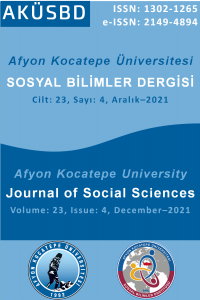Öz
Anahtar Kelimeler
Asaf Halet Çelebi Wilfred Owen Prophet Abraham symbolic order fictionalized order true order
Kaynakça
- Aydemir, M. (2014). Asaf Halet Çelebi’nin Şiirinde Geleneğin İzleri. International Journal of Turkish Literature Culture Education, 3(1), 218–239.
- Baudrillard, J. (2001). Selected Writings. California: Stanford University Press.
- Bloom, H. (Ed.). (2002). Poets of WWI: Wilfred Owen & Isaac Rosenberg. New York: Chelsea House Publishers.
- Carroll, R. & Prickett, S. (Eds.). (2008). Holy Bible: King James Version. Oxford: Oxford University Press.
- Corcoran, N. (2007). The Cambridge Companion to Twentieth-Century English Poetry. Cambridge: Cambridge University Press.
- Çelebi, A. H. (1993). Om Mani Padme Hum. İstanbul: Adam.
- Çelebi, A. H. (2018). Bütün Yazıları. İstanbul: Everest.
- Deleuze, G. (2004). Desert Islands and Other Texts, 1953-1974 (M. Taormina, Trans.). New York: Semiotext(e).
- Foucault, M. (1995). Discipline and Punish-The Birth of the Prison (A. Sheridan, Trans.). New York: Vintage Books.
- Foucault, M. (2001). Madness and Civilization: A History of Insanity in the Age of Reason (R. Howard, Trans.). London: Psychology Press.
- Foucault, M. (2009). Security, Territory, Population (G. Burchell, Trans.). New York: Picador.
- Greenblatt, S. (2012). Norton Anthology of English Literature 2. London: W. W. Norton & Company.
- Heaney, S. (1990). Government of the Tongue. New York: Farrar, Straus and Giroux.
- Hibberd, D. (2021). The Wilfred Owen Association. http://www.wilfredowen.org.uk/wilfred-owen/owen-the-poet. (Accessed: 18.02.2021).
- Kırımlı, B. (1995). Asaf Halet Çelebi (Hayatı, Eserleri, Sanatı ve Fikirleri). (Unpublished PhD). Ataturk University, Erzurum.
- Narlı, M. (2006). Asaf Halet Çelebi’nin Poetikası. İlmi Araşrımalar Dergisi, 22, 165–186.
- Norgate, P. (1989). Wilfred Owen and the Soldier Poets. The Review of English Studies, 40(160), 516–530.
- Owen, W. (1986). The Poems of Wilfred Owen. New York: W. W. Norton & Company.
- Owen, W. (2013). Complete Poems by Wilfred Owen. United Kingdom: Blackthorn Press.
- Poetry Foundation (2021). The Death Bed by Siegfried Sassoon. https://www.poetryfoundation.org/poems/57214/the-death-bed. (Accessed: 28.07.2021).
- Rivers, B. (2015). “A Parapet of Earth and Wood”: Possible Christological Typology in the Original Draft of Wilfred Owen’s “The Parable of the Old Man and the Young”. ANQ: A Quarterly Journal of Short Articles, Notes and Reviews, 28(2), 122–124. doi: 10.1080/0895769X.2015.1043044
- Sitwell, E. (1940). Still Falls the Rain. https://www.poetryarchive.org/poem/still-falls-rain. (Accessed: 18.02.2021).
- Stallworthy, J. (2017). Owen, Wilfred Edward Salter (1893–1918). Oxford Dictionary of National Biography. https://www.oxforddnb.com/view/10.1093/ref:odnb/9780198614128.001.0001/odnb-9780198614128-e-37828. (Accessed: 18.02.2021).
- The Qur’An. (2008). A. S. Öztürk (Trans.) Kayseri: Okyanus.
- Thomas, D. (1954). Quite Early One Morning. New York: New Directions Publishing.
- Thomson, J. (2021). Rule Britannia. https://www.poetryfoundation.org/poems/45404/rule-britannia. (Accessed: 28.07.2021).
- Treitschke, H. (1916). Politics. New York: The Macmillan Company.
- Uçman, A. (1993). Çelebi, Âsaf Hâlet. https://islamansiklopedisi.org.tr/celebi-asaf-halet. (Accessed: 15.02.2021).
- Virginia, W. (2009). Thoughts on Peace in an Air Raid. London: Penguin.
Öz
Anahtar Kelimeler
Asaf Halet Çelebi Wilfred Owen Hz. İbrahim sembolik düzen kurgulanmış düzen gerçek düzen
Kaynakça
- Aydemir, M. (2014). Asaf Halet Çelebi’nin Şiirinde Geleneğin İzleri. International Journal of Turkish Literature Culture Education, 3(1), 218–239.
- Baudrillard, J. (2001). Selected Writings. California: Stanford University Press.
- Bloom, H. (Ed.). (2002). Poets of WWI: Wilfred Owen & Isaac Rosenberg. New York: Chelsea House Publishers.
- Carroll, R. & Prickett, S. (Eds.). (2008). Holy Bible: King James Version. Oxford: Oxford University Press.
- Corcoran, N. (2007). The Cambridge Companion to Twentieth-Century English Poetry. Cambridge: Cambridge University Press.
- Çelebi, A. H. (1993). Om Mani Padme Hum. İstanbul: Adam.
- Çelebi, A. H. (2018). Bütün Yazıları. İstanbul: Everest.
- Deleuze, G. (2004). Desert Islands and Other Texts, 1953-1974 (M. Taormina, Trans.). New York: Semiotext(e).
- Foucault, M. (1995). Discipline and Punish-The Birth of the Prison (A. Sheridan, Trans.). New York: Vintage Books.
- Foucault, M. (2001). Madness and Civilization: A History of Insanity in the Age of Reason (R. Howard, Trans.). London: Psychology Press.
- Foucault, M. (2009). Security, Territory, Population (G. Burchell, Trans.). New York: Picador.
- Greenblatt, S. (2012). Norton Anthology of English Literature 2. London: W. W. Norton & Company.
- Heaney, S. (1990). Government of the Tongue. New York: Farrar, Straus and Giroux.
- Hibberd, D. (2021). The Wilfred Owen Association. http://www.wilfredowen.org.uk/wilfred-owen/owen-the-poet. (Accessed: 18.02.2021).
- Kırımlı, B. (1995). Asaf Halet Çelebi (Hayatı, Eserleri, Sanatı ve Fikirleri). (Unpublished PhD). Ataturk University, Erzurum.
- Narlı, M. (2006). Asaf Halet Çelebi’nin Poetikası. İlmi Araşrımalar Dergisi, 22, 165–186.
- Norgate, P. (1989). Wilfred Owen and the Soldier Poets. The Review of English Studies, 40(160), 516–530.
- Owen, W. (1986). The Poems of Wilfred Owen. New York: W. W. Norton & Company.
- Owen, W. (2013). Complete Poems by Wilfred Owen. United Kingdom: Blackthorn Press.
- Poetry Foundation (2021). The Death Bed by Siegfried Sassoon. https://www.poetryfoundation.org/poems/57214/the-death-bed. (Accessed: 28.07.2021).
- Rivers, B. (2015). “A Parapet of Earth and Wood”: Possible Christological Typology in the Original Draft of Wilfred Owen’s “The Parable of the Old Man and the Young”. ANQ: A Quarterly Journal of Short Articles, Notes and Reviews, 28(2), 122–124. doi: 10.1080/0895769X.2015.1043044
- Sitwell, E. (1940). Still Falls the Rain. https://www.poetryarchive.org/poem/still-falls-rain. (Accessed: 18.02.2021).
- Stallworthy, J. (2017). Owen, Wilfred Edward Salter (1893–1918). Oxford Dictionary of National Biography. https://www.oxforddnb.com/view/10.1093/ref:odnb/9780198614128.001.0001/odnb-9780198614128-e-37828. (Accessed: 18.02.2021).
- The Qur’An. (2008). A. S. Öztürk (Trans.) Kayseri: Okyanus.
- Thomas, D. (1954). Quite Early One Morning. New York: New Directions Publishing.
- Thomson, J. (2021). Rule Britannia. https://www.poetryfoundation.org/poems/45404/rule-britannia. (Accessed: 28.07.2021).
- Treitschke, H. (1916). Politics. New York: The Macmillan Company.
- Uçman, A. (1993). Çelebi, Âsaf Hâlet. https://islamansiklopedisi.org.tr/celebi-asaf-halet. (Accessed: 15.02.2021).
- Virginia, W. (2009). Thoughts on Peace in an Air Raid. London: Penguin.
Ayrıntılar
| Birincil Dil | İngilizce |
|---|---|
| Bölüm | Dil ve Edebiyat |
| Yazarlar | |
| Yayımlanma Tarihi | 29 Aralık 2021 |
| Gönderilme Tarihi | 11 Şubat 2021 |
| Yayımlandığı Sayı | Yıl 2021 Cilt: 23 Sayı: 4 |

This work is licensed under a Creative Commons Attribution-NonCommercial-NoDerivatives 4.0 International License.


